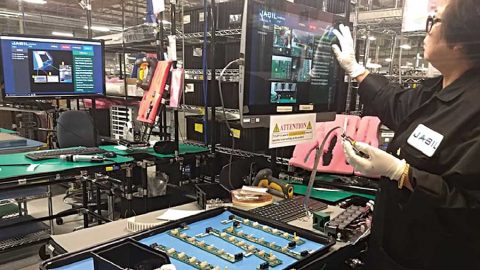
Illustration
Building complex assemblies is now a standard practice for electronic manufacturing services (EMS) companies. This reality applies to firms that do work locally, nationally or internationally.
Jabil Inc. is a U.S.-based global EMS company with electronics design, supply chain, production and product management capabilities. It currently operates 90 plants in 23 countries, employs more than 100,000 people and is well-known for investing heavily in the latest assembly technologies, such as metal additive manufacturing, to stay a market leader.
Despite these impressive credentials, Jabil does face assembly challenges at times. At one plant, assembly line workers must build more than 40 different complex electronic assemblies at any one time. Annually, the workers create more than 1,500 unique assemblies, each of which features a distinct combination of components.
To ensure that the operators complete each assembly efficiently and at the highest quality, Jabil recently installed a cloud-based manufacturing app platform from Tulip. With the platform’s App Builder system, Jabil’s process engineers are able to provide operators with step-by-step instructions for each assembly application. These instructions are clearly displayed on the monitor in each workstation along the assembly line, and ensure that a worker includes the correct parts in each assembly.
Jabil managers especially like that the application helps them identify and eliminate non-value-added steps in each assembly process, resulting in increased cell productivity, efficiency and product quality. Another benefit is the platform’s intuitive drag-and-drop interface, which is visual, interactive and user-friendly.
Once created, an application is smart. It digitizes processes, guides workflows with dynamic logic and collects operational data without requiring engineers to write any code or use complex manufacturing execution systems. The app is also easy to test, deploy, alter and improve in real time. It even enhances IIoT environments by connecting with machines, tools and sensors.
A user can select from and quickly customize a specific template from the App Builder library to build an application. Or, he can build it from scratch. In either case, images, videos, documents and CAD files can be added to make the app more user-friendly and increase team member engagement.
Another platform feature is called Tables. It lets users make data tables and databases as rigid or flexible as necessary to fit their unique business processes and adapt to evolving production needs. Data is collected in real time through interactive forms like drop-down menus, check-boxes and text fields, and includes feedback on key performance indicators for each manufacturing process. This data is displayed in tables and charts on an ongoing basis.
Simultaneously, the platform’s analytics engine automatically analyzes this data to optimize individual worker and cell productivity. Even during low-volume production runs, the platform’s real-time guiding, tracking and analyzing of operator and machine data ensures thorough root-cause analysis and continuous process improvement.
Since installing the Tulip platform, Jabil has seen a 50 percent increase in throughput and a 10 percent increase in production yield at the plant. Within four weeks of implementing the platform, assembly-related quality issues were reduced by 60 percent.
Source: Assembly Magazine